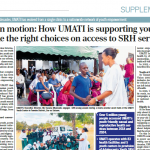| Richard Ryaganda
Globally, approximately 41% of all pregnancies are unintended. This means that about 99 million women each year will experience an unintended pregnancy (Guttmatcher, 2016). Around half of these pregnancies will end in abortion Ibid. In Tanzania, it is estimated that one million women get unintended pregnancy of which 39% end in abortion (Guttmatcher, 2016). As a result of in-access to safe abortion services, women are forced to keep unwanted pregnancy or procure unsafe abortion.
Most recent data from the Police Gender Desk Report, (2021) reveals that a total of 29,373 GBV cases were reported, out of which 12, 043 (41%) were cases of rape, incest and sexual assault. Whereas 6,305 (21.5%) women were raped, 5,751 (19.5%) women experienced sexual assault while other 20 women experienced incest. This high rate of rape cases was also revealed by the Minister of Home Affairs of Tanzania, Hon. Hamad Masauni when addressing the parliament on 6th April,2022, where he stated that from 2019 to March 2022, they were 19,726 rape cases out of 27,838 GBV cases, and 443 infants were abandoned.
This January, 2023, UMATI in collaboration with Guttmacher Institute and other partners convened 29 members of parliament from various committees. This convening’s focus was to strengthen policy makers capacity on sexual and reproductive health and rights issues and its importance to individuals of reproductive age.
The workshop also discussed challenges and complications that women and girls face when lacking good quality of care that may be caused by limited access to services due to reasons such as unavailability of service, qualified service providers or any other hindrance that contributes to increased maternal morbidity and mortality rates.
Policy makers reflected on their role in creating an enabling environment to improved sexual and reproductive health and rights service and information that will make a significant reduction of maternal deaths. Engagements of this nature helps to spark policy related conversations amongst members of parliament due to evidence that they gather.







